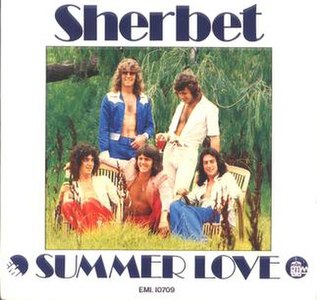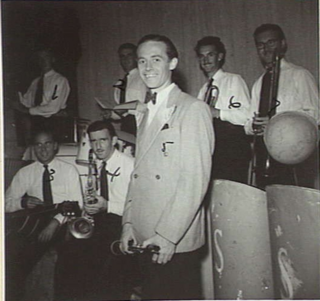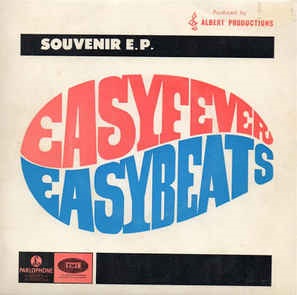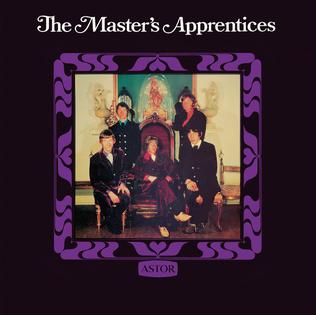Rock music in Australia, also known as Oz rock, Australian rock and Aussie rock, has a rich history, rooted in an appreciation of various rock genres originating in the United States and Britain, and to a lesser extent, in continental Europe and Africa. Australian rock has also contributed to the development of some of these genres, as well as having its own unique Australiana sound with pub rock and its indigenous music.
Spectrum are an Australian progressive rock band which formed in April 1969 and broke up in April 1973. The original line-up was Mark Kennedy on drums, Lee Neale on organ (ex-Nineteen87), Bill Putt on bass guitar, and Mike Rudd on guitar and lead vocals. In August 1970 Kennedy was replaced by Ray Arnott on drums. These members also performed under the alter ego, Indelible Murtceps, from 1971 to 1973. Spectrum had a number-one hit, "I'll Be Gone", on the Go-Set National Top 60 singles chart. After Spectrum and Indelible Murtceps disbanded, Putt and Rudd formed Ariel. In 1999 the pair formed Spectrum Plays the Blues, which later trimmed their name back to Spectrum. On 7 August 2013 Bill Putt died, after a heart attack.

The Twilights were an Australian rock band, which formed in Adelaide in 1964 by Peter Brideoake on rhythm guitar, John Bywaters on bass guitar, Clem "Paddy" McCartney and Glenn Shorrock both on lead vocals. They were joined by Terry Britten on lead guitar and Laurie Pryor on drums within a year. Heavily influenced by the British Invasion, they became a significant Australian band during the mid-1960s. They were noted for their musicianship, on-stage humour and adoption of overseas sounds and trends. Their most popular single is a cover version of "Needle in a Haystack", which topped the Go-Set singles chart in 1966. Also in that year, they won the Hoadley's Battle of the Sounds competition and were awarded a trip to London.
Matt Flinders is a former singer and TV presenter who rose to prominence in the late 1960s in Australia. He had top 5 hit singles with his cover versions of "Picking Up Pebbles" (1969) and "Butterfly" (1971). He hosted his own variety shows, The Matt Flinders Show (1972) and Matt Flinders and Friends (1973) on ABC-TV.

Festival Records was an Australian recording and publishing company founded in Sydney, Australia, in 1952 and operated until 2005.

"Summer Love" is a song by Australian pop group, Sherbet and was released in March 1975. It became their first number-one hit on the Australian Kent Music Report Singles Chart. The song was promoted on the newly aired ABC TV pop series, Countdown, which gave it wide exposure. From early 1975 the group made more appearances on the show than any other band in the programme's history. In October, at the King of Pop Awards, "Summer Love" won the Most Popular Australian Single, the band won Most Popular Australian Group and their lead singer, Daryl Braithwaite, won the King of Pop award.
Go Records was a small independent Melbourne-based recording label which ran from 1964 to 1968. Its releases were manufactured and distributed by the Melbourne-based recording and electronics company Astor.

Horace Andrew Dargie was an Australian musician, television compère, talent manager, music label founder and music arranger. As a member of Horrie Dargie Quintet he was awarded the first gold record in Australia for their 10-inch live album, Horrie Dargie Concert (1952), which sold 75,000 copies. In the late 1950s and early 1960s he compèred TV variety programmes Personally Yours (1959), BP Super Show (1959–1962) and The Delo and Daly Show (1963–1964). Dargie co-produced teen pop music programme, The Go!! Show (1964–1967), and as well as organising its on-screen performers he established the related Go!! Records label to provide an outlet for artists' singles. He was inducted into the ARIA Hall of Fame in 1996. Dargie was married twice.
Mark Opitz is an Australian record producer and audio engineer. He started his career with Australian Broadcasting Corporation (ABC) in 1971. He has produced AC/DC, the Angels, Australian Crawl, Cold Chisel, Divinyls and INXS. He has won the ARIA Award for Producer of the Year in 1987 and 1988. He had previously won Best Australian Producer at the Countdown Awards for his work in 1980, 1982, 1985 and 1986. On 8 June 2020 he was appointed a Member of the Order of Australia (AM) for "significant service to the performing arts, particularly to music production." In August of that year he was listed as one of The 7 Most Influential Music Producers of All Time by Mixdown Magazine's David Tomisch and Will Brewster.

Duncan Hazlett McGuire, was an Australian musician, songwriter, recording engineer and producer. McGuire was a founding member of the jazz fusion band, Ayers Rock from 1973 until he left in 1976. As a bass guitarist he appeared in several of Parkinson's groups including the Questions (1965–1968), Doug Parkinson in Focus (1968–1969) and the Southern Star Band (1978–1981). He went into music production in the early 1980s, in October 1980 he co-produced and engineered the debut self-titled album by Australian rock band, INXS. Duncan McGuire was diagnosed with lung cancer; and died in July 1989 of an associated brain tumour, aged 46.
Albert Music, formerly J Albert and Son, is an Australian company with an estimated worth in 2009 of more than A$209 million. The company has major interests in music publishing and production and it earns significant royalties through its subsidiary, Albert Productions which manages the music catalogue of the Australian rock band AC/DC. Alberts was acquired by BMG Rights Management in July 2016.
Bill and Boyd were a pop music duo from 1959 to 1989 consisting of William "Bill" Cate and William "Boyd" Robertson, both on lead vocals and lead guitar, which started recording in 1960. They began their careers in Wellington, New Zealand before relocating to Sydney by 1964. In 1968 they toured United States supporting The Supremes and Herb Alpert.

EMI Recorded Music Australia Pty Ltd is an Australian imprint of Universal Music Australia, formerly a subsidiary label of EMI Recordings Ltd and, between 1979 and 1996, that of Thorn EMI. It is Australia's largest major dance music label as well it was one of Australia's largest major labels overall until the Universal acquisition. Corporate headquarters are located in Sydney, Australia.

Mark Kennedy is an Australian musician who has been the drummer for several artists including Spectrum (1969–70), Doug Parkinson in Focus (1971), Leo de Castro (1971–73), Ayers Rock (1973–76), Marcia Hines (1976–83), Men at Work (1985), Renée Geyer and Jimmy Barnes (2005).
"Buried and Dead" is a song by Australian rock group, the Masters Apprentices, released in May 1967 on Astor Records as the second single from the band's debut self-titled extended play. It peaked at No. 26 on the Go-Set national singles charts.
Ronald Stewart Tudor MBE was an Australian music producer, engineer, label owner and record industry executive. He started his career with W&G Records in 1956 as a sales representative; he became their in-house producer and A&R agent before leaving in 1966.

"Come and See Her" is a song written by Stevie Wright and George Young. It was released as the sixth single for their Australian rock group the Easybeats in April 1966, which reached No. 3 on the Australian charts. It was the group's debut single in the United Kingdom, issued on the United Artists Records in July.

Easyfever by Australian rock and roll group the Easybeats was their fourth official extended play. It was issued to coincide with the band's departure for the United Kingdom. It appeared in August 1966 and reached number one on the Australian singles charts, something that had only been achieved once before by an EP. The songs on the EP did not appear on any of the Easybeats' official studio albums, however, they were included as bonus tracks on the 1992 CD reissue of their It's 2 Easy album.

The Masters Apprentices is the self titled debut studio album by the Masters Apprentices, released in June 1967 on Astor Records. It featured two hit singles; "Undecided" and "Buried and Dead", both of which has been released on The Masters Apprentices EP in February 1967.









